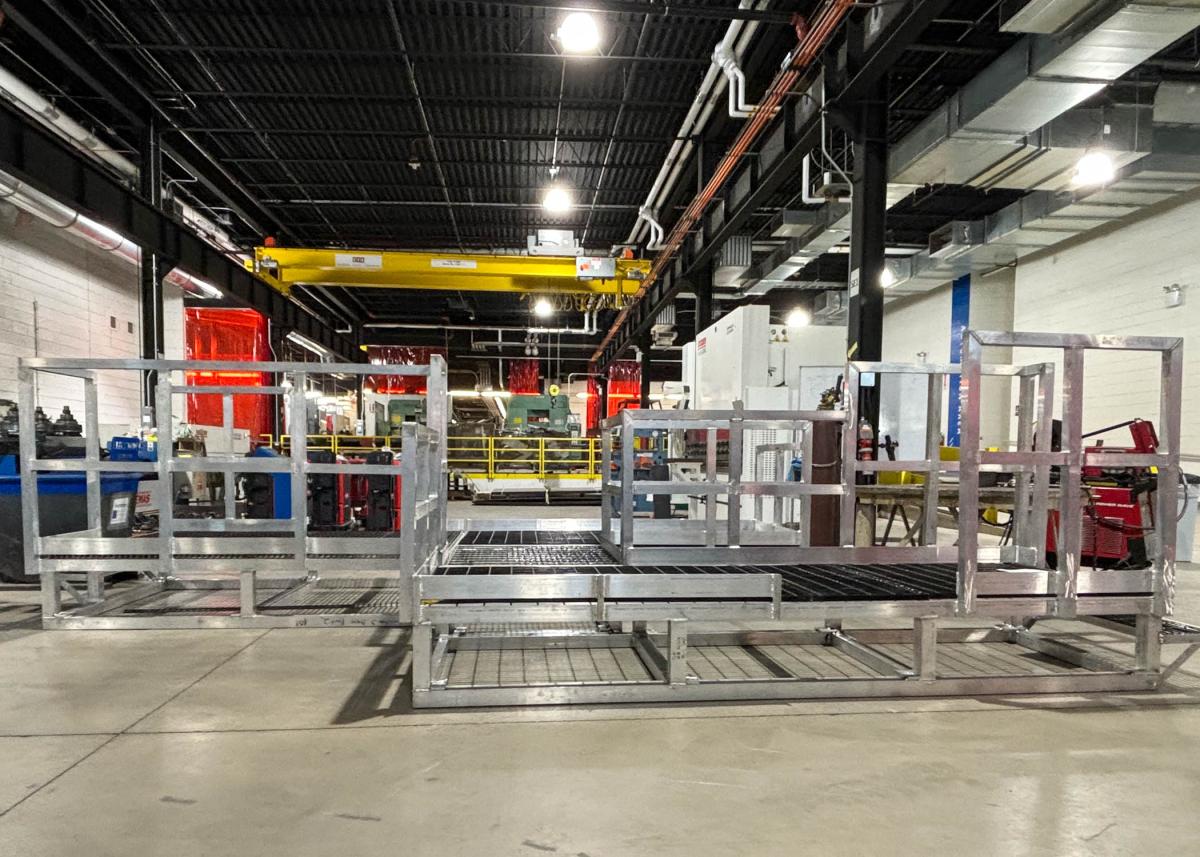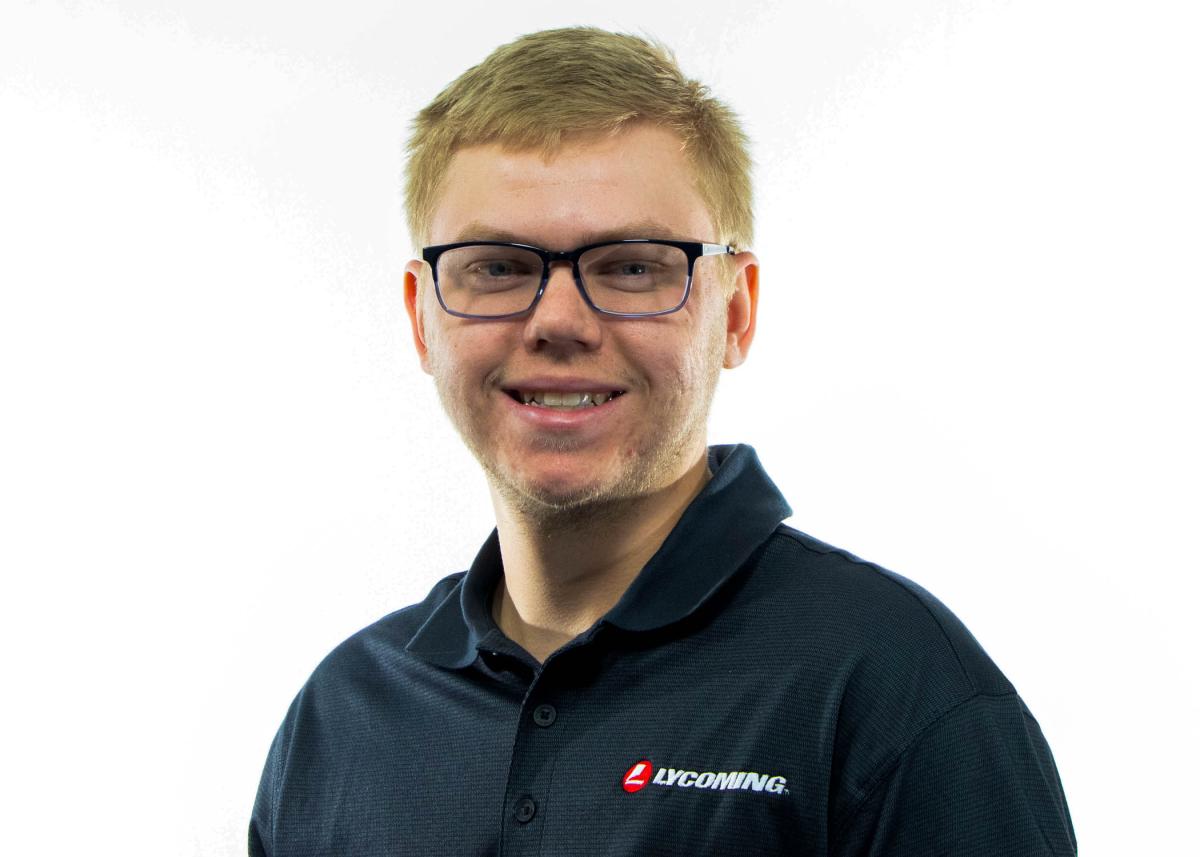Penn College students team with Lycoming Engines for project
Thursday, April 25, 2024
Lycoming Engines recently employed the talents of Pennsylvania College of Technology students for a project that will have lasting benefits for the renowned company.
At the request of Lycoming, welding students – as part of a class project – fabricated an access platform designed by Tyler J. Gustafson, of Warren, majoring in engineering design technology. The aluminum structure will span between two new Okuma LU-45 twin-turret lathes, which are intended to help expand Lycoming’s internal cylinder barrel manufacturing capacity.

As part of a class project, welding students at Pennsylvania College of Technology fabricated an access platform for Lycoming Engines that will span between two new Okuma LU-45 twin-turret lathes. The structure measures 190 square feet. About 40 students helped manufacture the aluminum platform for the company.
A Corporate Tomorrow Maker, Lycoming manufactures piston engines that power more than half of the world’s general aviation fleet, both rotary and fixed-wing.
“The lathes are much larger than any other lathes currently utilized at Lycoming, which presented us with a work-loading challenge that we have never had to overcome before. We needed to come up with a way to safely get the operator access to the internals of the machines for repetitive machine-tending activities,” explained Tyler McCoy, senior project manager for Lycoming Engines.
McCoy – recipient of two Penn College degrees: a bachelor’s in manufacturing engineering technology (2016) and an associate in civil engineering technology (2014) – turned to his alma mater for assistance. He didn’t have to look far.
Since 2022, Gustafson has worked at Lycoming as an industrial engineer co-op student.
“He clearly has a passion for design work, so when the challenge of installing our two new twin-turret lathes presented itself, I challenged him to come up with a solution,” McCoy said.
“I am very grateful for this opportunity. I have learned a lot throughout this project,” Gustafson said. “This is the first time to design something this large that is being fabricated. I was able to use the materials I learned in the classroom and apply them out in industry. I am excited to see the platform implemented and used on the shop floor.”

Tyler J. Gustafson
About 40 students enrolled in three sections of the Welding Blueprint & Layout II course spent several weeks manufacturing the platform. Led by Michael R. Allen, instructor of welding and co-department head, the students prepped all materials, cut the aluminum and fabricated the platform in the college’s 55,000-square-foot lab.
“We did a weld-off to determine which students would do the welding,” Allen said. “We then assigned four welders to each section of the platform. The other students focused on fitters and other prep work.”
The weld-off tested the students’ proficiency with both tungsten arc welding (TIG) and metal inert gas welding (MIG), the two processes used for the project.
Allen selected Eric R. Hill, a welding & fabrication engineering technology student from Lemont, to weld beams together for one section of the platform. Hill employed TIG welding to fill gaps and join the beams.
“I am very grateful that Penn College is able to give these types of opportunities and experiences to our classes,” Hill said. “I feel the students are more engaged when the project is being done for a company. Doing projects like this makes me more prepared for the workplace. I was able to build on skills such as reading blueprints, communication and problem-solving.”
Allen smiled when asked to assess the quality of his students’ work. “I’m happy as heck with it,” he said. “The fact that Lycoming Engines came to us to fabricate the platform, rather than doing it themselves or contracting with a vendor, speaks volumes about our welding program.”
“This project clearly reflects the synergy between academic departments at Penn College and between the school and industry,” added Bradley M. Webb, dean of engineering technologies. “We are very proud of our students’ efforts to provide a solution – in both design and fabrication – for a valued cooperate partner such as Lycoming Engines.”
Over 30% of Lycoming Engines’ employees are Penn College graduates.
“Lycoming couldn’t be happier with Penn College,” McCoy said. “We look forward to more opportunities like this in the future.”
For more information on engineering design, welding and other degrees offered by Penn College’s School of Engineering Technologies, call 570-327-4520.
Penn College is a national leader in applied technology education. Email the Admissions Office or call toll-free 800-367-9222 for more information.
